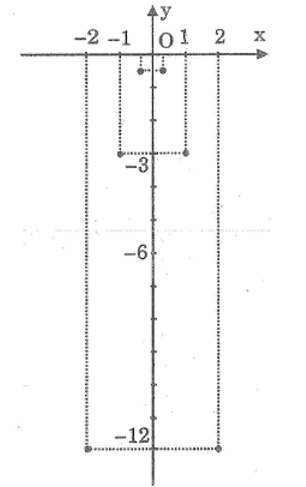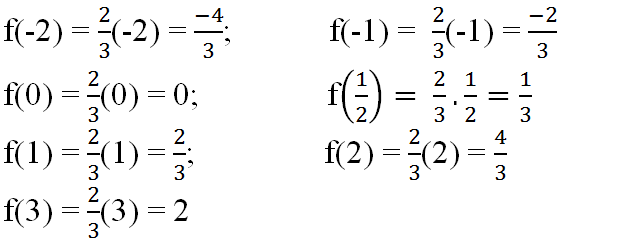Hãy nhập câu hỏi của bạn vào đây, nếu là tài khoản VIP, bạn sẽ được ưu tiên trả lời.

a: Khi x=-2 thì \(y=-3\cdot\left(-2\right)^2=-12\)
Khi x=-1 thì \(y=-3\cdot\left(-1\right)^2=-3\)
Khi x=-1/3 thì \(y=-3\cdot\dfrac{1}{9}=-\dfrac{1}{3}\)
Khi x=0 thì y=0
Khi x=1/3 thì \(y=-3\cdot\dfrac{1}{9}=-\dfrac{1}{3}\)
Khi x=1 thì y=-3
Khi x=2 thì y=-12
b:

Câu 1:
a)
| \(y=f\left(x\right)=2x^2\) | -5 | -3 | 0 | 3 | 5 |
| f(x) | 50 | 18 | 0 | 18 | 50 |
b) Ta có: f(x)=8
\(\Leftrightarrow2x^2=8\)
\(\Leftrightarrow x^2=4\)
hay \(x\in\left\{2;-2\right\}\)
Vậy: Để f(x)=8 thì \(x\in\left\{2;-2\right\}\)
Ta có: \(f\left(x\right)=6-4\sqrt{2}\)
\(\Leftrightarrow2x^2=6-4\sqrt{2}\)
\(\Leftrightarrow x^2=3-2\sqrt{2}\)
\(\Leftrightarrow x=\sqrt{3-2\sqrt{2}}\)
hay \(x=\sqrt{2}-1\)
Vậy: Để \(f\left(x\right)=6-4\sqrt{2}\) thì \(x=\sqrt{2}-1\)

\(a,\dfrac{x+2\sqrt{x}-3}{\sqrt{x}-1}\)
\(\Leftrightarrow\dfrac{x+3\sqrt{x}-\sqrt{x}-3}{\sqrt{x}-1}\)
\(\Leftrightarrow\dfrac{\sqrt{x}.\left(\sqrt{x}+3\right)-\left(\sqrt{x}+3\right)}{\sqrt{x}-1}\)
\(\Leftrightarrow\dfrac{\left(\sqrt{x}+3\right)\left(\sqrt{x}-1\right)}{\sqrt{x}-1}\)
\(\Rightarrow\sqrt{x}+3\)
\(b,\dfrac{4y+3\sqrt{y}-7}{4\sqrt{y}+7}\)
\(\Leftrightarrow\dfrac{4y+7\sqrt{y}-4\sqrt{y}-7}{4\sqrt{y}+7}\)
\(\Leftrightarrow\dfrac{\sqrt{y}.\left(4\sqrt{y}\right)-\left(4\sqrt{y}+7\right)}{4\sqrt{y}+7}\)
\(\Leftrightarrow\dfrac{\left(4\sqrt{y}+7\right).\left(\sqrt{y}-1\right)}{4\sqrt{y}+7}\)
\(\Rightarrow\sqrt{y}-1\)
\(c,\dfrac{x\sqrt{y}-y\sqrt{x}}{\sqrt{x}-\sqrt{y}}\)
\(\Leftrightarrow\dfrac{\sqrt{xy}.\left(\sqrt{x}-\sqrt{y}\right)}{\sqrt{x}-\sqrt{y}}\)
\(\Rightarrow\sqrt{xy}\)
\(d,\dfrac{x-3\sqrt{x}-4}{x-\sqrt{x}-12}\)
\(\Leftrightarrow\dfrac{x+\sqrt{x}-4\sqrt{x}-4}{x+3\sqrt{x}-4\sqrt{x}-12}\)
\(\Leftrightarrow\dfrac{\sqrt{x}.\left(\sqrt{x}+1\right)-4\left(\sqrt{x}+1\right)}{\sqrt{x}.\left(x+3\right)-4\left(\sqrt{x}+3\right)}\)
\(\Leftrightarrow\dfrac{\left(\sqrt{x}+1\right).\left(\sqrt{x}-4\right)}{\left(\sqrt{x}+3\right).\left(\sqrt{x}-4\right)}\)
\(\Leftrightarrow\dfrac{\sqrt{x}+1}{\sqrt{x}+3}\)
\(\Rightarrow\dfrac{x-2\sqrt{x}-3}{x-9}\)
\(e,\dfrac{1+\sqrt{x}+\sqrt{y}+\sqrt{xy}}{1+\sqrt{4}}\)
\(\Leftrightarrow\dfrac{1+\sqrt{x}+\sqrt{y}+\sqrt{xy}}{1+2}\)
\(\Rightarrow\dfrac{1+\sqrt{x}+\sqrt{y}+\sqrt{xy}}{3}\)

a.f(-2)=/2.(-2)-3/=/-4-3/=/-7/=7
f(8)=/2.8-3/=/16-3/=/13/=13
b. với y =-1 ta có: /2x-3/=-1(vô nghiệm)
với y=3 ta có: /2x-3/=3
2x-3=3 hoặc 2x-3=-3
2x=6 hoặc 2x=0
x=3 hoặc x=0
a) Ta lần lượt có :
f ( - 2 ) = | 2-(-2)-3 | = | -4 - 3 | = | -7 | = 7
f( 8 ) = | 2x - 3 | = | 2 . 8 - 3 | = | 16 - 3 | = | 13 | = 13
b) Ta lần lượt có :
- Với y = -1 thì | 2x - 3 | = -1 , vô nghiệm bởi | 2x - 3 | > 0
- Với y = 3 thì | 2x - 3 | = 3
↔ 2x - 3 = 3 hoặc 2x - 3 = -3
↔ 2x = 6 hoặc 2x = 0
↔ x = 3 hoặc x = 0

em xin lỗi nhưng em chưa đủ tuổi để làm bài này xin cáo từ
xin lỗi quản lý olm ạ
a) Ta có:
f(−2)=23.(−2)=−43;f(−1)=23.(−1)=−23;f(0)=23.0=0;f(12)=23.12=13;f(1)=23.1=23;f(2)=23.2=43;f(3)=23.3=2.f(−2)=23.(−2)=−43;f(−1)=23.(−1)=−23;f(0)=23.0=0;f(12)=23.12=13;f(1)=23.1=23;f(2)=23.2=43;f(3)=23.3=2.
b) Ta có:
g(−2)=23.(−2)+3=53;g(−1)=23.(−1)+3=73;g(0)=23.0+3=3;g(12)=23.12+3=103;g(1)=23.1+3=113;g(2)=23.2+3=133;g(3)=23.3+3=5.g(−2)=23.(−2)+3=53;g(−1)=23.(−1)+3=73;g(0)=23.0+3=3;g(12)=23.12+3=103;g(1)=23.1+3=113;g(2)=23.2+3=133;g(3)=23.3+3=5.
c) Khi biến xx lấy cùng một giá trị thì giá trị của hàm số y=f(x)y=f(x) luôn nhỏ hơn giá trị tương ứng của hàm số y=g(x)y=g(x) là 3 đơn vị.

c) Từ kết quả câu a, b ta được bảng sau:
Nhận xét:
- Các hàm số y = f(x) = 2/3 x và y = g(x) = 2/3 x + 3 là hai hàm số đồng biến vì khi x tăng thì y cũng nhận được các giá trị tương ứng tăng lên.
- Cùng một giá trị của biến x, giá trị của hàm số y = g(x) luôn luôn lớn hơn giá trị tương ứng của hàm số y = f(x) là 3 đơn vị.
a) Cho hàm số : \(y=f\left(x\right)=\dfrac{2}{3}x\)
Ta có : \(f\left(-2\right)=\dfrac{2}{3}.\left(-2\right)=-\dfrac{4}{3}\)
\(f\left(-1\right)=\dfrac{2}{3}.\left(-1\right)=-\dfrac{2}{3}\)
\(f\left(0\right)=\dfrac{2}{3}.0=0\)
\(f\left(\dfrac{1}{2}\right)=\dfrac{2}{3}.\dfrac{1}{2}=\dfrac{1}{3}\)
\(f\left(1\right)=\dfrac{2}{3}.1=\dfrac{2}{3}\)
\(f\left(2\right)=\dfrac{2}{3}.2=\dfrac{4}{3}\)
\(f\left(3\right)=\dfrac{2}{3}.3=2\)
b) Cho hàm số : \(y=g\left(x\right)=\dfrac{2}{3}x+3\)
\(g\left(-2\right)=\dfrac{2}{3}.\left(-2\right)+3=\dfrac{5}{3}\)
\(g\left(-1\right)=\dfrac{2}{3}.\left(-1\right)+3=\dfrac{7}{3}\)
\(g\left(0\right)=\dfrac{2}{3}.0+3=3\)
\(g\left(\dfrac{1}{2}\right)=\dfrac{2}{3}.\dfrac{1}{2}+3=\dfrac{10}{3}\)
\(g\left(1\right)=\dfrac{2}{3}.1+3=\dfrac{11}{3}\)
\(g\left(2\right)=\dfrac{2}{3}.2+3=\dfrac{13}{3}\)
\(g\left(3\right)=\dfrac{2}{3}.3+3=5\)
c) Khi \(x\)lấy cùng một giá trị thì giá trị của \(g\left(x\right)\) lớn hơn giá trị của \(f\left(x\right)\) là \(3\) đơn vị.


